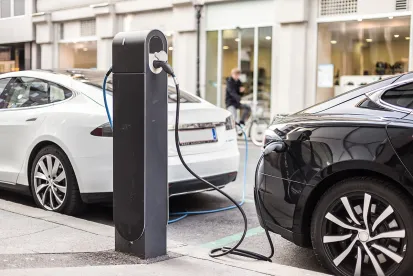Recent federal legislation seeks to address the ever-increasing demand for electric vehicle (EV) infrastructure. On Nov. 15, 2021, the Infrastructure Investment and Jobs Act (IIJA) was signed into law. The IIJA specifically allocates $7.5 billion specifically for EV infrastructure programs and grants on a national level. In addition, on Nov. 19, 2021, the House of Representatives passed the Build Back Better Act (BBBA), which if successful in becoming law, could provide additional grants and tax incentives for EV charging equipment and infrastructure. The following focuses on the EV infrastructure grants and programs under the IIJA, since it has already been signed into law.
Infrastructure Investment and Jobs Act
Of the $7.5 billion the IIJA provides for EV infrastructure grants and programs to build out a national network of EV charging stations, $2.5 billion is to be used for charging and refueling infrastructure grants, and the remaining $5 billion is to be allocated to the National Electric Vehicle Charging Program as more specifically discussed below.
A. Grants for Charging and Fueling Infrastructure
The IIJA sets aside $2.5 billion for grant awards to eligible entities for strategic deployment of publicly accessible EV charging infrastructure and hydrogen, propane, or natural gas fueling infrastructure. To qualify for the grants, eligible entities must contract with private entities for acquisition, installation, construction, maintenance, and/or operation of publicly accessible EV charging infrastructure directly related to EV charging. Such infrastructure must also be located along a designated “alternative fuel corridor” or certain locations accessible to all EV drivers.
An eligible entity receiving the grant may use part of the funds to provide the private entity with operating assistance for up to five years of operation after the installation of the EV charging infrastructure. The eligible entities under these grants include: states and their political subdivisions, local government units, metropolitan planning organizations, American Indian tribes, U.S. territories, special purpose districts or public authorities with a transportation function (e.g., port authority), and groups of the above entities.
An eligible entity receiving a grant under this program can use the grant funds to contract with private entities to acquire, construct, install, maintain, and/or operate EV charging infrastructure. The eligible entity may also enter into a cost-sharing agreement with private entities, which will in turn submit to the eligible entity a portion of the private entity’s revenue from the EV charging infrastructure.
The eligible entities are also required to demonstrate in their applications the following:
| (1) | Public accessibility of the charging/fueling infrastructure; |
|
| (2) | Collaborative engagement with various stakeholders; |
|
| (3) | Charging station’s location and various operational and distribution standards; |
|
| (4) | Responsiveness of infrastructure installation to technology advancements (e.g., accommodation to autonomous vehicles and future charging technology); |
|
| (5) | Long-term operation and maintenance of charging/fueling infrastructure; and |
|
| (6) | Assessment of estimated emission reduction via the use of the charging/fueling infrastructure using the Alternative Fuel Life-Cycle Environmental and Economic Transportation tool. |
In addition to the location and private entity contracting requirements mentioned above, the eligible entities also will be subject to certain considerations by the U.S. Department of Transportation (DOT), including whether the EV charging infrastructure would: improve an alternative fueling corridor, meet current or future market demands for EV charging infrastructure, enable or accelerate the construction of EV charging infrastructure (that would be unlikely to be completed without federal assistance), provide access to EV charging infrastructure in areas with current or forecasted need, deploy EV charging infrastructure for medium- and heavy-duty vehicles, and support a long-term competitive market for EV charging infrastructure with no significant impairment to the existing EV charging infrastructure providers, among others.
The maximum grant amount under this program is capped at $15 million.
B. National Electric Vehicle Formula Program
The National Electric Vehicle Formula Program under the IIJA allocates $5 billion through 2026 to states for the strategic deployment of EV charging infrastructure and the establishment of an interconnected network for data collection, access, and reliability. Similar to the EV charging and fueling infrastructure grants, in order to be eligible for funding, the infrastructure must be publicly accessible and located along a designated “alternative fuel corridor.”
In order to receive the funds, states must submit their plans to the DOT, subject to various information disclosure and assessment requirements, as well as certain formulas to be developed by DOT.
The funds are limited to the following uses:
| (1) | Acquisition and installation of EV charging infrastructure; |
|
| (2) | Operation and maintenance of EV charging infrastructure; and |
|
| (3) | Data sharing of EV charging infrastructure to ensure long-term investment success. |
DOT’s Federal Highway Administration (FHWA), in coordination with the U.S. Department of Energy (DOE), has accepted comments from interested parties and issued program guidance for states and localities. The guidance provides details for the state and localities regarding: (1) distance between publicly available EV charging infrastructure; (2) connections to the electric grid, including electric distribution upgrades and vehicle-to-grid integration; (3) proximity of existing off-highway travel centers, fuel retailers, and small businesses to the newly acquired or funded EV charging infrastructure; (4) the need for publicly available EV charging infrastructure in rural corridors as well as underserved or disadvantaged communities; (5) long-term operation and maintenance of EV charging infrastructure; (6) existing private, federal, state or local EV charging programs and incentives; (7) fostering public-private or private investment in EV charging infrastructure; and (8) meeting current and anticipated market demands for EV charging infrastructure (i.e., power levels and charging speed).
C. Other Grant Programs
IIJA also establishes several EV charging infrastructure incentive programs outside of the $7.5 billion EV infrastructure budget, most notably: (1) Advanced Energy Manufacturing and Recycling Grant Program; (2) Consideration of Measures to Promote Greater Electrification of the Transportation Sector; and (3) Grants for Energy Efficiency Improvements and Renewable Energy Improvements at Public School Facilities.'
| (1) |
Advanced Energy Manufacturing and Recycling Grant Program |
The Advanced Energy Manufacturing and Recycling Grant Program under the IIJA will provide $750 million for the DOE to award grants to eligible entities to carry out “qualifying advanced energy projects,” including facilities manufacturing EVs, EV charging equipment, and fuel cells.
In order to be considered an “eligible entity” under the Advanced Energy Manufacturing and Recycling Grant Program, the entity must be a manufacturer with gross annual sales of less than $100 million, have fewer than 500 employees, and have an annual energy bill between $100,000 and $2,500,000. Eligible entities also will be subject to certain application requirements, selection criteria, and ongoing reporting obligations.
| (2) |
Consideration of Measures to Promote Greater Electrification of the Transportation Sector |
The IIJA amends the Public Utility Regulatory Policies Act of 1978 to encourage state public utility commissions to “promote greater electrification of the transportation sector,” including: (1) promotion of affordable and equitable EV charging options for residential, commercial and public EV charging infrastructure; (2) improvement of customer experience with EV charging; (3) acceleration of third-party investment in EV charging for light, medium-, and heavy-duty EVs; and (4) appropriate recovery of the marginal costs of electricity delivery to EVs and EV charging Infrastructure. The funding is not currently specified and will be provided on a state level.
| (3) |
Grants for Energy Efficiency Improvements and Renewable Energy Improvements at Public School Facilities |
The DOE will award competitive grants to eligible entities for energy improvements, including the installation of alternative fuel vehicle infrastructure on school grounds for (i) exclusive use of school buses; school fleets, or students; or (ii) the general public. Alternative fuel vehicle infrastructure includes EV charging stations. To qualify as an eligible entity under this grant, an eligible entity must be a consortium of: (1) local educational agencies; or (2) one or more schools, nonprofit organizations, community partners, or for-profit organizations with the knowledge and capacity to partner and assist with such energy improvements.
Applications under this grant program must include: (1) the school or school facilities’ needs assessment; (2) a draft work plan of the eligible entity’s intended achievements at school; (3) a capacity description; (4) a plan description; (5) an assessment of the expected needs for operation and maintenance; (6) an assessment of the expected energy efficiency, energy savings, and safety benefits; (7) a cost estimate of the proposed project; and (8) an identification of other resources that may be required.
The competitive criteria of the grants includes:
| a. | the extent of the disparity between the fiscal capacity of the eligibility entity (to carry out said energy improvements at public school facilities) and the needs of the partnering local educational agency; |
|
| b. | the likelihood of the partnering local educational agency or eligible entity to maintain such energy improvements in good condition; |
|
| c. |
the potential energy efficiency and safety benefits from the proposed energy improvements.
|
| IIJA | |||||
| Programs | Grants for Charging and Fueling Infrastructure | National Electric Vehicle Formula Program | Advanced Energy Manufacturing and Recycling Grant Program | Consideration of Measures to Promote Greater Electrification of the Transportation Sector | Grants for Energy Efficiency Improvements and Renewable Energy Improvements at Public School Facilities. |
| Funding | $2.5 billion | $5 billion | $750 million | TBD (State) | $500 million |
Conclusions
IIJA provides a major stimulus to the further development of EV infrastructure, especially with respect to charging stations. The IIJA is a great first step in helping to build out a national network of EV charging stations and incentivize public-private partnerships in EV infrastructure. If the BBBA is signed into law, there may be additional grants and tax incentives available for further development of EVs and EV infrastructure. We expect to learn more on the EV equipment and infrastructure grants and tax incentives available under the BBBA in the upcoming months.



 />i
/>i

